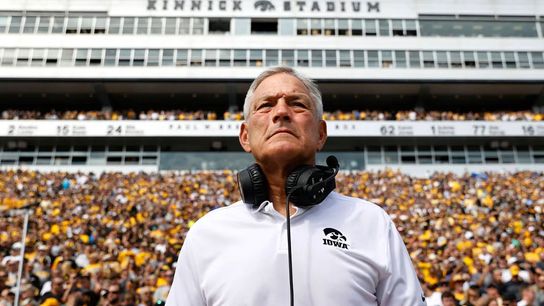With room to spare, Iowa's Kirk Ferentz is college football's dean of coaches at the sport's upper-most level.
A quarter-century deep at Iowa, Ferentz has no one in the Football Bowls Subdivision within five years of his tenure, and he's speaking in plain terms as it relates to college football's ongoing upheaval, particularly as it relates to the now-wide open NCAA Transfer Portal as well as the essentially unregulated world of Name, Image and Likeness "pay-for-play" programs.
Iowa just absorbed one of the more bizarre situations in the Portal/NIL era when Kadyn Proctor, an Iowa native, entered the Portal in January after an Freshman All-America season at Alabama, returned home to the Hawkeyes and was rewarded with some NIL funds in the process.
Proctor has not joined the Hawkeyes in spring camp and is instead expected to be headed back to Alabama, where Kalen DeBoer has taken over for Nick Saban.
Ferentz didn't address Proctor by name, saying only that he expected he would finish this semester at Iowa and then leave, but then soon did correlate the current state of affairs in college football to his earlier coaching in the NFL.
"The one thing I will say, I spent six years in the NFL: It's funny, Charlie Bullen was back here this morning; just took a job with the Giants," Ferentz said of his former understudy, who spent five years as an Iowa graduate assistant. "And we were talking about the difference of the college football versus NFL. At least when you sign a contract [in the NFL], you sign a contract, coaches and players, and you're there or you don't work. It's one or the other.
"I don't know how we get there in college football or college athletics, but it would be nice to have some clarity and already know, hey, this is what it's going to be this year, and then the next year is new, a new circumstance."
Ferentz's comments closely mirrored those of Ole Miss coach Lane Kiffin, a Portal savant who nonetheless has urged at least a one-year minimum for a player who transfers schools and receives the accompanying NIL funds.
Asked directly about college football having devolved into a legal pay-for-play ecosystem, Ferentz didn't deny the current landscape.
"Well, that's kind of what NIL tends to be it seems like," Ferentz told reporters. "At least it's going in that direction. I'm not sure what pay-for-play means, but if you offer a guy a really good package -- it's kind of like the NFL. We thought we had a chance to get Reggie White. His wife was from Cleveland. He ended up in Green Bay.
"It wasn't because of the facilities. It was a better contract. I think there's probably some of that going on certainly in what we're doing. It's probably naïve to think that that's not the case."
If Ferentz was college football's overlord rather than a head coach at a Power 4 program, what would his solution be?
"You would need a team of lawyers to probably answer the question," Ferentz said. "It seems like everything that happens has legal ramifications to it. I don't know what the answer is. I guess I'm just drawing the analogy or the parallel.
"The thing was easy at least in the National Football League is a player signs a contract and he's there for the year. He has the option of not playing, but if he's under contract, if he plays -- you can argue about that, too, but at least there's a lot of clarity.
"Again, I'm not against the transfer portal. I'm not against NIL by any stretch. I think my initial fear with NIL going back to whenever it started getting talked about and started picking up some traction, I'm old enough to remember -- I think it was Nebraska or Army. I can't tell you what year, I think it was '72 or '73; they beat them 77-7 or 77-0 and it was unpatriotic and really not a game where -- neither team really benefitted from it.
"To me if you start getting into that, then the risk of football drifting back to haves and have-nots increases a little bit if it's strictly on pocketbooks.
"Hopefully we won't get to that point, but that's one of the potential byproducts of it."
